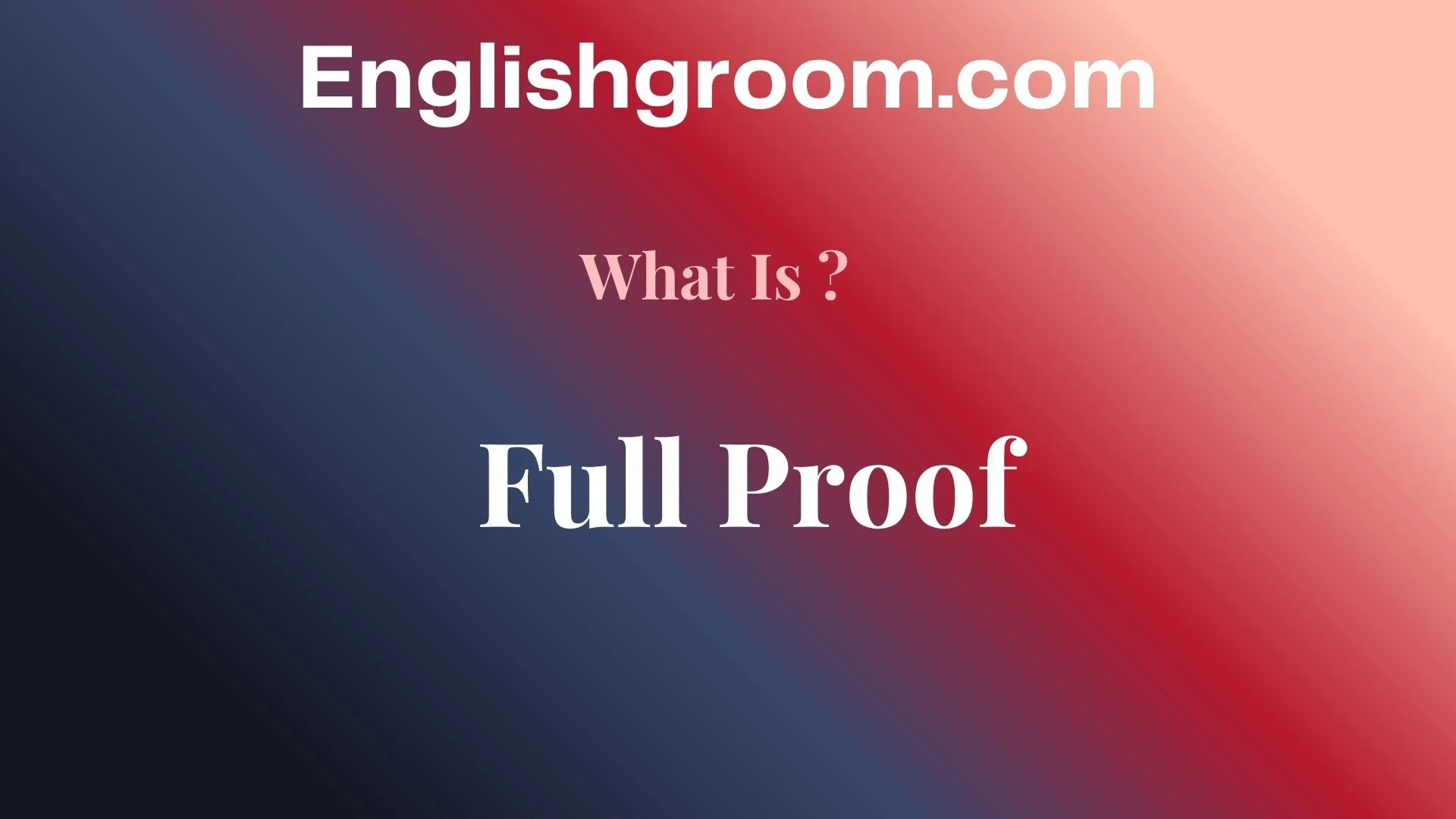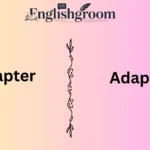Have you ever typed “full proof” and wondered if it was correct? Or perhaps you read it somewhere and thought, “Wait, isn’t it ‘foolproof’?” You’re not alone.
Many people mix up these two phrases because they sound similar, but their meanings and histories are very different.
In this article, we’ll uncover the truth behind “full proof”, explore the real meaning of “foolproof”, and give you clear guidance on which one to use.
Is “Full Proof” Actually a Real Phrase?
The first question is simple: does “full proof” exist as a legitimate phrase?
Technically, yes—but not in the way most people think. Historically, “full proof” appeared in legal, technical, and historical texts, but it didn’t mean “easy to use” or “cannot fail.” Instead, it literally referred to something that is fully proven or verified.
For example, in legal texts from the 17th and 18th centuries, you might find phrases like:
“The evidence is of full proof and leaves no doubt in judgment.”
Here, “full proof” means complete proof, not foolproof.
Key Takeaways:
- “Full proof” is real, but it is rare and mostly historical.
- Its meaning is literal, unlike the modern idiomatic use of “foolproof.”
- Most modern uses of “full proof” as a synonym for “foolproof” are incorrect.
Why People Confuse “Full Proof” and “Foolproof”
It’s easy to see why these two phrases get mixed up. Let’s break down the main reasons:
Phonetic Confusion
“Full proof” and “foolproof” sound almost identical when spoken quickly. Many people assume spelling follows sound, which leads to mistakes in writing.
Autocorrect and Typing Errors
Modern devices often auto-suggest “full proof” because it’s a real phrase in the dictionary, or they may correct unfamiliar words incorrectly.
Semantic Assumptions
Many assume “full proof” makes sense logically—full = complete, “proof” = guaranteed. It seems intuitive but doesn’t match the idiomatic English expression.
Foolproof: The Correct Term
If you want to express that something cannot fail or is very reliable, the correct term is “foolproof.”
Definition
According to the Oxford English Dictionary:
Foolproof (adjective): designed to be safe, easy, or reliable so that it cannot fail or be misused.
Etymology
The word “foolproof” emerged in the 20th century, originally in engineering and technical contexts. It described systems designed to prevent human error, often called fail-safe mechanisms.
Synonyms
- Idiot-proof
- Fail-safe
- Error-proof
- Easy to use
- Reliable
Example sentences:
- “This software is foolproof; even beginners can navigate it easily.”
- “The new safety mechanism is foolproof, preventing accidents before they happen.”
“Full Proof” vs. “Foolproof”: Direct Comparison
To make it crystal clear, here’s a table comparing both phrases:
| Feature | Full Proof | Foolproof |
|---|---|---|
| Meaning | Fully proven, verified, complete proof | Cannot fail, safe, easy to misuse |
| Origin | Historical, legal, or technical texts | 20th century, engineering context |
| Correct Context | “Evidence of full proof” | “A foolproof plan” |
| Common Misuse | “This plan is full proof” | None |
| Example | “The contract is of full proof.” | “The design is foolproof.” |
Examples of “Full Proof” in Correct Context
Here are some historical and technical examples of “full proof” used properly:
- Legal context: “The witness gave testimony of full proof regarding the transaction.”
- Historical document: “The claim is of full proof before the council.”
- Technical context: “The evidence is of full proof after rigorous testing.”
Notice how these do not mean ‘cannot fail’, but rather fully substantiated.
Examples of Incorrect Modern Usage of “Full Proof”
Unfortunately, many writers today use “full proof” when they actually mean “foolproof.” Examples include:
- ❌ “This recipe is full proof; anyone can make it.”
- ❌ “The software is full proof, so you won’t make mistakes.”
Correct versions:
- ✅ “This recipe is foolproof; anyone can make it.”
- ✅ “The software is foolproof, preventing user errors.”
Examples of “Foolproof” in Everyday Usage
Foolproof is widely used in business, technology, and casual conversation. Here are some examples:
- “The instructions are foolproof; even a beginner can assemble the furniture.”
- “Our marketing strategy is foolproof, designed to attract customers efficiently.”
- “This lock is foolproof against tampering.”
Case Study:
A tech company introduced a foolproof login system requiring only a single step for user verification. Errors dropped by 90% within a month, demonstrating the practical value of foolproof design.
Quick Grammar and Usage Tips
Here are some tips to avoid mixing up “full proof” and “foolproof”:
- Check context: If you mean “cannot fail,” always use foolproof.
- Think literally: “Full proof” = fully proven. Use only in legal, historical, or technical senses.
- Use mnemonic: Foolproof = “fails for no fool.”
Other Commonly Confused Word Pairs
Many words are misused in a similar way. Watch out for:
- Could care less vs. Couldn’t care less
- Bring vs. Take
- Ironic vs. Coincidental
- Lie vs. Lay
- Imply vs. Infer
Knowing these distinctions improves both writing and credibility.
When (If Ever) Should You Use “Full Proof”?
“Full proof” is correct only when used literally, meaning fully proven or verified. Examples:
- ✅ “The evidence presented is of full proof in the court.”
- ✅ “After testing, the results are of full proof and reliable.”
Avoid casual or idiomatic use like:
- ❌ “This method is full proof for beginners.”
Summary Table: Key Takeaways
| Term | Meaning | Usage Context | Example Sentence |
|---|---|---|---|
| Full Proof | Fully proven, verified | Legal, historical, technical | “The evidence is of full proof.” |
| Foolproof | Cannot fail, safe, reliable | Everyday use, engineering, systems | “This plan is foolproof.” |
Frequently Asked Questions (FAQs)
What does “full proof” really mean?
It means fully proven or verified, often used historically or technically.
Is “foolproof” the same as “full proof”?
No. Foolproof means cannot fail, while full proof means fully proven.
Can I use “full proof” in casual writing?
Only if you mean fully substantiated. Otherwise, it’s better to use foolproof.
Where did “foolproof” come from?
It emerged in the 20th century, primarily in engineering and technical contexts.
Are there synonyms for “foolproof”?
Yes: idiot-proof, fail-safe, error-proof, reliable.
Conclusion
In short, “full proof” and “foolproof” are not interchangeable. “Full proof” is historical and literal, while “foolproof” is idiomatic, meaning something cannot fail.
By understanding their origins, meanings, and correct contexts, you can avoid embarrassing mistakes and improve your writing clarity.

Hi! I’m Sami, a 28-year-old content writer with a love for words and storytelling. Writing has always been my way of expressing ideas, sharing knowledge, and connecting with people. I enjoy creating engaging and well-researched content—whether it’s blogs, articles, or social media posts—that not only informs but also inspires readers. My goal is to turn complex ideas into clear, creative, and meaningful pieces of writing that leave a lasting impact.



